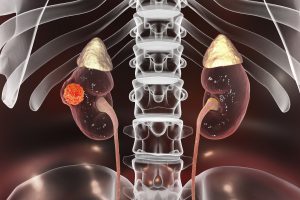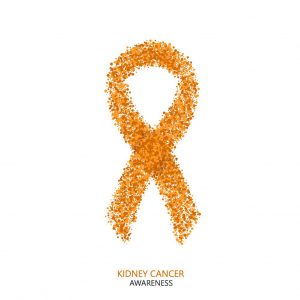
Because of the World-Kidney-Day on March 14, there is a new post about another rare disease in Germany. The renal cell carcinoma is the most common form of kidney cancer and appears mainly among elderly people. This blog discribes the location, structure and function of this organ, kidney cancer in general, as well as causes and treatment of this disease.

The kidney
Location
Every person has two bean-shaped kidneys, each weighing just under 120 grams.1 They are located on the back side of the body at the eleventh and twelfth vertebra below the diaphragm.2 Thereby the right kidney lies a little bit deeper than the left one, because the liver is located above it.2
Anatomy
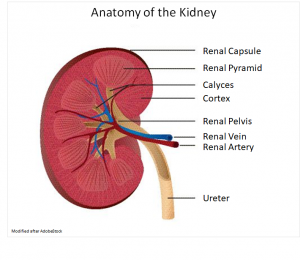 The kidney is divided into renal tissue and renal pelvis due to the structure.3 The fomer contains about one million small filter units, called nephrons consisting of glomeruli (renal corpuscle) and tubuli (renal tubes).4 The renal tissue contains the cortex, the renal medulla and the calyces.1 The renal medulla consists of 10 to 12 conical structures, called the renal pyramids.5 The hilum of kidney encompasses the kidney artery and vein and acts like a passage for the lymphatic vessels, nerves and the ureter.4 The kidney is enclosed by the renal capsule, also called connective tissue capsule, performing a protective task.4
The kidney is divided into renal tissue and renal pelvis due to the structure.3 The fomer contains about one million small filter units, called nephrons consisting of glomeruli (renal corpuscle) and tubuli (renal tubes).4 The renal tissue contains the cortex, the renal medulla and the calyces.1 The renal medulla consists of 10 to 12 conical structures, called the renal pyramids.5 The hilum of kidney encompasses the kidney artery and vein and acts like a passage for the lymphatic vessels, nerves and the ureter.4 The kidney is enclosed by the renal capsule, also called connective tissue capsule, performing a protective task.4
Function
The purification of the blood and the formation of urine are the main tasks of the kidney.3 The nephrons detoxify the body by filtering harmful substances from the blood and secreting it as urine into the urinary tract.1,3 The purified blood is then trace back to the body via the kidney vein.4 The urine produced in this way is collected in the renal pelvis and is transported via the ureter into the bladder to be excreted through the urethra.3
Kidney cancer
According to the German Cancer Registry, all malignant diseases of the kidney, renal pelvis and ureter are reffered as kidney cancer.6 In case of the most common form of kidney cancer, the renal cell carcinoma (hypernephron), the cells of the renal tubes begin to degenerate.1,6 This form accounts for approximately 90-96% of all kidney tumors.7
Because the kidney is heavily supplied with blood and connects to large blood vessels, tumor cells can rapidly spread throughout the body and form metastases.6 These occur mainly in the lungs, liver, brain and bones.6
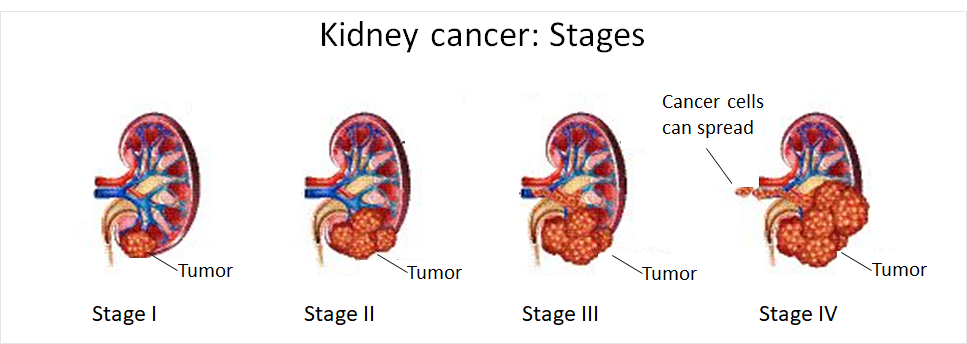
Epidemiology
Malignant tumors in the kidney are generally rare in Germany and account for around 2% of all tumors.6 Over here, every year about 6,000 women and 10,000 men develop kidney cancer,1 thereby men are twice as common affected.8
Statistics show that the incidence among men increased since the 1990s, whereas it decreased among women since 2009.8 Age-standardized mortality rates are decreased in both sexes.8 The average age at diagnosis is 72 years for women and 67 years for men.8 Young peole are very rarely affected by this cancer type.3
Cause
An exact cause leading to the formation of renal cell carcinomas isn’t known.6 Often, it can’t be determined even afterwards.3 However, carcinogenesis is favored by several risk factors:
- Smoking6,7
- Alcohol abuse6,7
- Hypertension6,7
- High-fat diet6
- Low fluid intake6
- Chronic kidney weakness6
- Contact with kidney damaging substances7
- Increasing age6
- Hereditary factors6
Therapy
The most important procedure after getting a diagnosis is an operation.9 The affected kidney is partially or completely removed.9 In 96.5% of all cases, only one kidney is affected by cancer.1 The efficiency of the healthy kidney can fully compensate the loss of the removed kidney.9 Once the tumor has spread, radiation is used (additionally).9 Chemotherapy isn’t effective in the treatment of kidney cancer.9
Targeted therapy
Targeted therapy is part of personalized medicine.10 The focus is based on the biological properties of the tumor.10 By testing for specific biomarkers, the differences between a healthy and a cancer cell can be determined.10 On this basis, drugs are used, for example, to suppress certain metabolic processees and thus prevent the growth of cancer cells.9 There’re already several targeted drugs for the treatment of kidney cancer approved (for example bevacizumab, sorafenib)9 another 26 are under developement.11
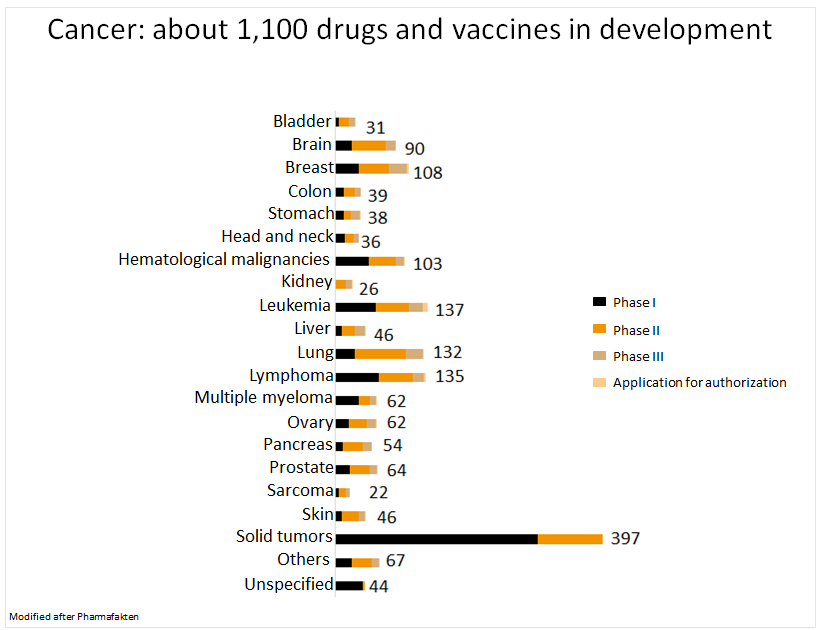
Contact person:
Kristina Schraml (kristina.schraml@biovariance.com)

